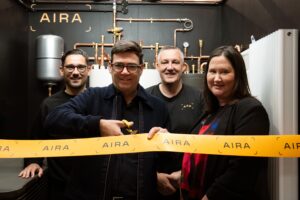Shining a light on setting up a solar farm
As the first local authority-backed solar farm to qualify for the Contracts for Difference (CfD) funding mechanism, Cambridgeshire County Council’s new 12MW facility in Soham is truly in a league of its own.
With 45,000 panels spread across a 70-acre site, the new solar farm, which was officially launched this week, will generate enough electricity to power the equivalent of 3,000 homes.
Subject to completion of final commissioning, the farm will also create generate £1m a year in revenue for the county council from an initial investment of £9m.
Bouygues E&S FM UK Limited (Bouygues Energies & Services), Savills, Local Partnerships and the Low Carbon Contracts Company all partnered with Cambridgeshire County Council to build this large-scale solar farm, which is now generating electricity.
But speaking to Environment Journal, the county council’s project director for the scheme Sheryl French, says this scheme has taken several years to develop.
‘I can truly say this has been a journey of overcoming barriers,’ she says. ‘I still believe there are a lot of barriers in the market for solar projects, but there is hope.’
Work to develop the solar farm started in 2013, when the local authority began looking at five possible sites across the county.
‘We were also in the position of getting this through all the planning process, when the change to the feed-in-tariff announcement happened, so we had to get ourselves organised to submit our case to Contracts for Difference instead,’ she says.
In February 2015, it was confirmed the county council was successful in its bid under the scheme, but because of delays with the process itself, they only had six months left to negotiate with the Low Carbon Contract Company, which administers the scheme.
‘We needed to make a certain level of return to secure a decision on the investment,’ explains French. ‘The CfD auction provided us with that security, low-risk investment opportunity.’
While Cambridgeshire County Council was the first local authority to win funding for a solar farm in a CfD auction, it also has the dubious honour of being the last, as solar farm projects are now excluding from bidding under the current arrangements.
And although more CfD auctions are expected in the coming years, there is still no confirmation of when or whether they will ever include solar energy again.
‘Cambridgeshire has its own challenges,’ she admits. ‘Cambridge is a small city and then you have Peterborough at the other end of the county. Then you have a large rural hinterland, which is mostly farming.
‘So a lot of the projects you can develop will not be significant £300m projects. They will be medium-scale projects.
Lessons learned
In March this year, the county council adopted a corporate energy strategy, which will support the roll out of more schemes.
French says the county council is currently piloting a different smart energy project, which will charge electric vehicles and sell excess to customers around one of the council’s park and ride sites.
‘When we first started off, we had a strong vision for energy, but it wasn’t enough to engage stakeholders and to get their buy in,’ she recalls.
‘What we found was we had to take an approach where you help others think about the energy requirements they needed for their agenda in housing, transport and digital infrastructure.
‘We found if you just have an energy vision on its own, it didn’t work as well as when you tagged it into a range of other sectors. Basically, you need a broad influence of other strategies to get the message over.’
She adds there is also a ‘big difference between potential projects and ones that are investable and has a strong business case’.
‘There is a lot of work which needs to take something from a potential project to an investable project, which means you need up front project development cost money,’ she says.
And there is a risk around project development costs.
‘Hopefully, eight out of your 10 projects will come out and will transform into something that will generate a profit, but you also have to understand that some might not,’ says French. ‘That’s a big hurdle, which local authorities need to work through themselves.’
The chair of the Cambridgeshire County Council’s economy and environment committee, Cllr Ian Bates, commented: ‘When I talk to our communities they are rightly keen that we spend our money wisely and by finding a way to create income, these extra millions can be spent on much used frontline services.
‘This county council solar park project is a great investment as it means we are producing renewable energy and income while reducing the need either to make cuts or ask our residents to make up the shortfall through additional taxes. But this is just one example of the many things that we are doing to make the best use of our assets.’















